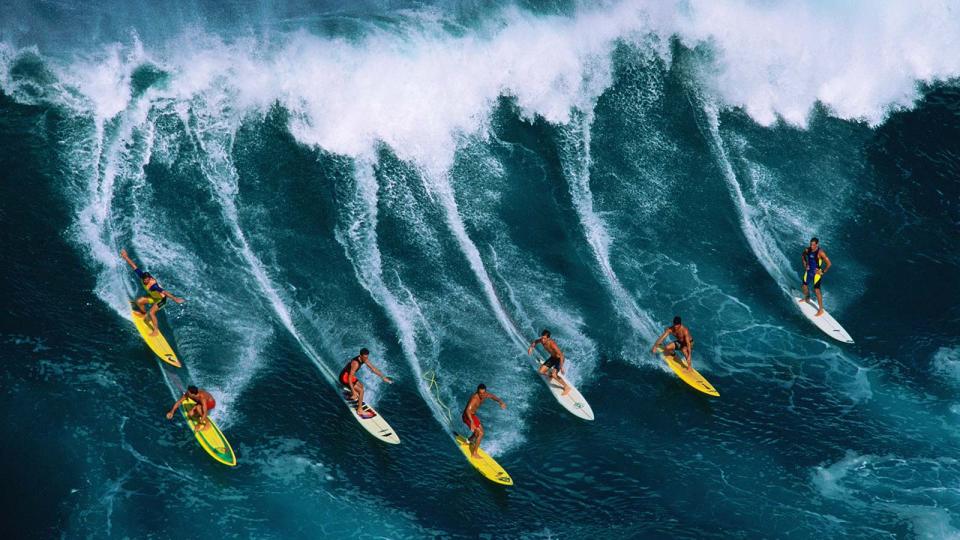15 Basic Hawaiian Words and Phrases

You won't find too many U.S. destinations more beautiful than Hawaii, which is known for its lush mountains, active volcanoes, and relaxing beaches. But beyond just seeing the sights, one of the best ways to celebrate Hawaiian culture is to speak the language. By trying out a few of these phrases on your next trip, you can become a part of the growing movement to revitalize this endangered language. Yes, that's right: At one point, Hawaiian was on the verge of vanishing.
Even though it's now one of the official languages in the state, Hawaiian was officially banned in schools after the kingdom was overthrown in the late 1800s. As a result, the number of speakers dramatically declined. But in the last 50 years, a Hawaiian language renaissance has swept the state and is slowly bringing back the traditional tongue.
Not everyone you encounter on your vacation will speak the language, but those that do might be pleasantly surprised that you're giving Hawaiian a go. So before you start packing your bags, commit a handful of these useful Hawaiian words and phrases to memory.
Related: 7 Destinations in Hawaii Where the Locals Love to Go

Getty Images
Basic Hawaiian Words
Aloha (and its variations)
Even though you'll often hear aloha used as a greeting, it's also a way of life. You can use aloha to send out kindness, positive intentions, and respect to others. On your trip, you can get familiar with aloha by using it at four different times of the day.
Aloha kakahiaka: Pronounced a-lo-ha kah-kah-hee-yah-kah
Use this phrase to say good morning.
Aloha awakea: Pronounced a-loh-ha av-ah-kay-ah
You should use this variation of aloha when it's late morning. It roughly translates to "good noontime."
Aloha 'auinalā: Pronounced a-loh-ha ah-wee-na-lah
Try this out when you want to say good afternoon.
Aloha ahiahi: Pronounced a-loh-ha a-hee-yah-hee
This one means good evening. Watch your pronunciation because "ahi" means tuna. You can prevent yourself the embarrassment of saying "tuna tuna" by using something called a "y-glide" in the middle of the word. Instead of saying "a-hee a-hee," pronounce it like "a-hee-yah-hee."
Lū'au: Pronounced loo-ah-oo
Hopefully, you're going to experience the wonder of a lū'au on your trip. This event is so much more than a party that includes hula dancing. The word lū'au itself actually refers to leaves of the taro plant, which has great significance in the Hawaiian culture. You're bound to find taro in more than a few dishes during this celebration.
Mahalo: Pronounced mah-hah-loh
Mahalo means thank you. It appears on a lot of trash can doors, so a lot of tourists think it means garbage. Not so! Get even more specific with your mahalo by adding a few extra words. Mahalo nui (pronounced mah-hah-loh noo-ee) means "thank you very much." And if you really appreciate something, you can say mahalo nui loa (pronounced mah-hah-loh noo-ee loh-wah), which means "thank you so very much."
Wahine: Pronounced vah-hee-neh
Looking for the women's bathroom? This word will be on the door.
Kāne: Pronounced kah-neh
This word will appear on the men's bathroom door.
Common Hawaiian Phrases
'A'ole pilikia: Pronounced ah-oh-leh pee-lee-kee-yah
Use this phrase if someone thanks you. It means "you're welcome."
A 'o ia!: Pronounced ah-oy-yah
Cheer on your best friend if he or she gets up to do the hula or exclaim this when someone finally catches a wave during a surf lesson. It's akin to saying "there you have it!"
Hui!: Pronounced hoo-wee
There's a polite way of saying "hey you," and this is it.
E kala mai: Pronounced eh kah-lah mah-yee
Spill your drink or bump into someone in a crowd? You can use this phrase to apologize or say excuse me.
Useful Hawaiian Sayings for Travelers
Ma uka: Pronounced mah-oo-kah
People use ma uka as a directional term meaning "upland." You might hear someone say something like, "We'll be ma uka today doing the zipline."
Ma kai: Pronounced mah-kie-yee
Ma kai is the opposite of ma uka, and it means "seaward." Invite people to grab a drink with you "at the boathouse ma kai" during your trip.
A hui hou: Pronounced ah-hoo-wee-ho-oo-uu
This phrase means "until we meet again."

